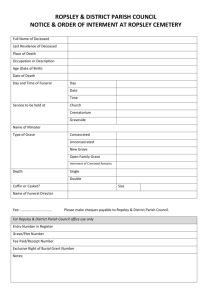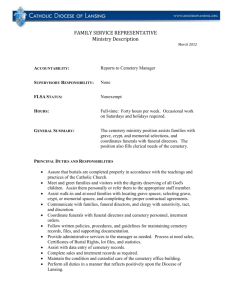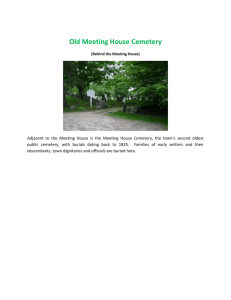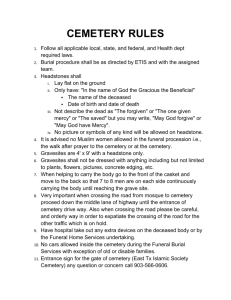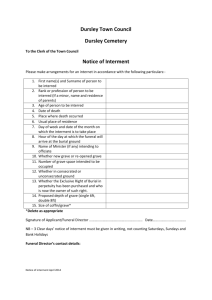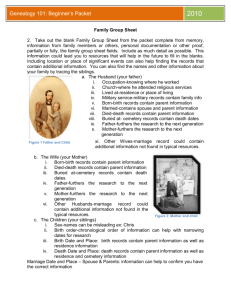social security administration act 1992
advertisement
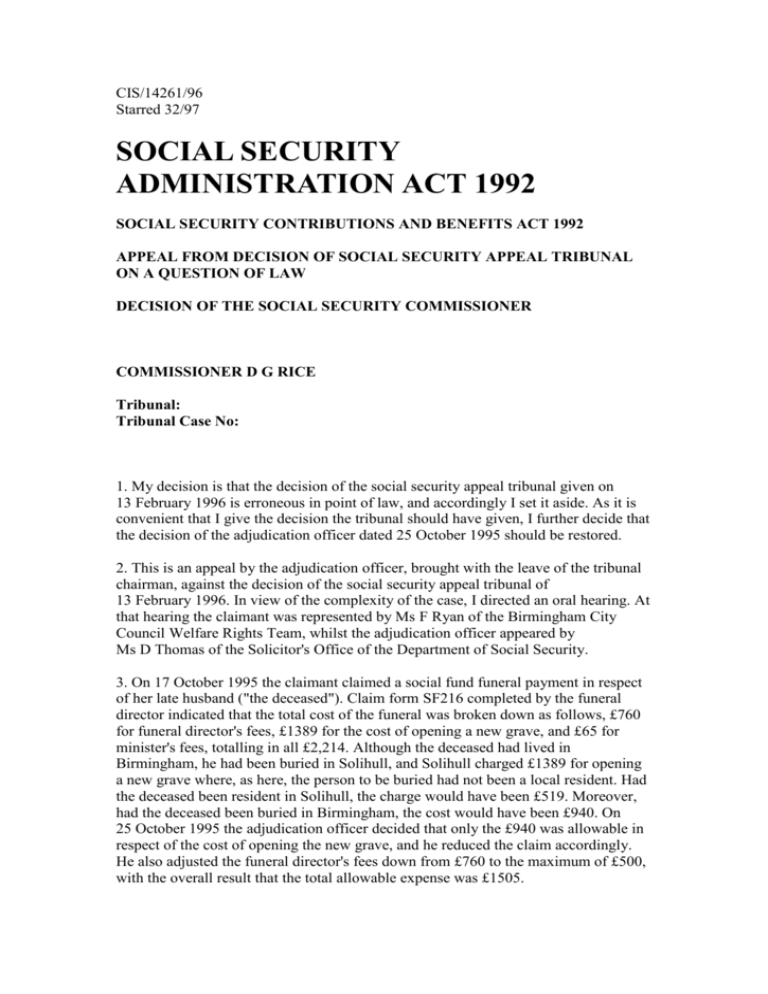
CIS/14261/96 Starred 32/97 SOCIAL SECURITY ADMINISTRATION ACT 1992 SOCIAL SECURITY CONTRIBUTIONS AND BENEFITS ACT 1992 APPEAL FROM DECISION OF SOCIAL SECURITY APPEAL TRIBUNAL ON A QUESTION OF LAW DECISION OF THE SOCIAL SECURITY COMMISSIONER COMMISSIONER D G RICE Tribunal: Tribunal Case No: 1. My decision is that the decision of the social security appeal tribunal given on 13 February 1996 is erroneous in point of law, and accordingly I set it aside. As it is convenient that I give the decision the tribunal should have given, I further decide that the decision of the adjudication officer dated 25 October 1995 should be restored. 2. This is an appeal by the adjudication officer, brought with the leave of the tribunal chairman, against the decision of the social security appeal tribunal of 13 February 1996. In view of the complexity of the case, I directed an oral hearing. At that hearing the claimant was represented by Ms F Ryan of the Birmingham City Council Welfare Rights Team, whilst the adjudication officer appeared by Ms D Thomas of the Solicitor's Office of the Department of Social Security. 3. On 17 October 1995 the claimant claimed a social fund funeral payment in respect of her late husband ("the deceased"). Claim form SF216 completed by the funeral director indicated that the total cost of the funeral was broken down as follows, £760 for funeral director's fees, £1389 for the cost of opening a new grave, and £65 for minister's fees, totalling in all £2,214. Although the deceased had lived in Birmingham, he had been buried in Solihull, and Solihull charged £1389 for opening a new grave where, as here, the person to be buried had not been a local resident. Had the deceased been resident in Solihull, the charge would have been £519. Moreover, had the deceased been buried in Birmingham, the cost would have been £940. On 25 October 1995 the adjudication officer decided that only the £940 was allowable in respect of the cost of opening the new grave, and he reduced the claim accordingly. He also adjusted the funeral director's fees down from £760 to the maximum of £500, with the overall result that the total allowable expense was £1505. 4. As the claimant already had an insurance policy towards the cost of the funeral amounting £744.95, the net award made by the adjudication officer came to £760.05 [mistyped as £706.05]. The claimant sought a review, but on 28 November 1995 the adjudication officer refused the request. It was against this refusal that the claimant appealed. 5. The only question that was in issue before the tribunal was whether or not the claim for the costs of opening a new grave should have been reduced from £1389 to £940. 6. The relevant statutory provision is regulation 7 of the Social Fund Maternity and Funeral Expenses (General) Regulations 1987[S.1.1987 No. 481]. Regulation 7(3) sets out certain allowable expenses and then regulation 7(4) reads as follows:" (4) In addition to the costs specified in paragraph (3), the amount of a funeral payment shall include an amount sufficient to meet:(a) in the case of an interment, the necessary costs of a new or reopened grave and of the interment" The tribunal gave a wide interpretation to the word "necessary". They said as follows:"We have concentrated on the interpretation in regulation 7 of the phrase 'necessary cost of a new grave'. In our judgment those words are not to be interpreted so as to limit a social fund payment to the cheapest cost of a new grave, regardless of convenience or reasonableness for the widow. In this case we are satisfied that it was clearly reasonable for [the claimant] to choose the nearest and most accessible cemetery, even though it lay on the other side of a local government boundary. We think the word 'necessary' in the phrase in question is designed to exclude any costs over and above the basic cost of obtaining a new grave in a convenient cemetery, and should not be interpreted so as to restrict the choice of cemetery in a way that ignores reasonableness or convenience." Accordingly, the tribunal allowed the appeal, and increased the social fund payment to £1209.05, so that the claimant recouped the full cost of opening the grave. 7. The adjudication officer now concerned, in support of the appeal, contends as follows:" 10. In his decision R(IS) 11/91 the Commissioner held at paragraph 6 that 'home' should be construed as the 'accommodation where the deceased normally lived prior to his death'. It is not disputed that the deceased normally lived in Sheldon, Birmingham, prior to his death. 11. In decision R(IS) 14/92 the Commissioner held at paragraph 10 that it must be borne in mind that funeral payments are drawn from public funds for the benefit of persons who are in receipt of meanstested benefits. In that context there must inevitably be a restriction on costs and even where the word 'reasonable' is not employed it should be implied. 12. Regulation 7(4)(a) .... provides for the necessary cost of a new grave. I submit this is a stronger test than the test of reasonableness, and it is my submission that the tribunal misdirected itself in finding that the phrase 'necessary cost' 'is designed to exclude any cost over and above the basic cost of obtaining a new grave in a convenient cemetery, and should not be interpreted so as to restrict the choice of cemetery in a way that ignores reasonableness or convenience'. I submit that a tighter interpretation of 'necessary' is appropriate. It is more than desirability or personal preference or convenience. The deceased could have been buried just as decently in a Birmingham cemetery, without the extra cost incurred by choosing a cemetery outside the area in which he lived. 13. It is my submission that although the claimant may have wished to have her husband buried at a cemetery in the area where it was easier for her to visit his grave, it was not necessary for him to be buried there as there was a cemetery in the area of their home. The extra cost incurred as a result of the interment taking place where he was a nonresident arose purely from the personal wishes of the claimant." 8. I see the force of the above submission. The contention is in effect that, where the interment is to take place in a new grave, only the necessary costs involved are payable out of public funds and the word "necessary" implies that such costs are to be kept to the minimum. In other words, any expense more than is properly required is to be excluded. 9. Now, where an interment is to take place in a new grave, it will be necessary to purchase a plot, and the cost of a plot will vary depending upon its location, and if the cost is to be kept to a minimum, prima facie the plot to be selected must be the one which is the cheapest available. I say "prima facie" because I am not satisfied that the effect of the statutory provision is to require the purchase of the cheapest possible plot without regard to any other consideration whatsoever. First, I think that the location of the new grave must be within reasonable proximity to the residence of the deceased whilst he was alive. The fact that a grave could be obtained (say) some 50 miles away cheaper than one available locally would not, in my view, be an acceptable economy measure. Moreover, it would be a wholly unacceptable imposition on a claimant to require him or her to consider the cost of all plots, however far away, for the purpose of identifying the cheapest. Ms Thomas endeavoured to persuade me that there was such a burden imposed on the claimant, and if a new grave could be obtained at a cheaper price, not withstanding, it was 50, 100 or 200 miles away, it had to be taken. I am not so persuaded. 10. Apart from other considerations, the further the distance involved, the greater the likelihood of there being increased charges imposed by the funeral director for his services. Regulation 7(3) does not contemplate a distance of more than 50 miles, and in any event imposes a £500 limit on the total funeral costs other than the expense of acquiring a plot. It would be wholly unacceptable to expect a claimant to incur costs in excess of the statutory limit of £500 in pursuit of a cheaper plot even within the 50 miles radius, let alone some greater distance. But irrespective of this consideration, how would a claimant know where the cheapest plot was, either within the 50 mile radius or outside it? Ms Thomas contended that the local undertakers were well equipped with information of this kind, and all the claimant had to do was to make enquiry in that quarter. I have no evidence before me that all funeral directors are acquainted with the cost of plots outside their local areas, and a claimant, who will normally be very distressed, may not realise the necessity of probing into this matter with the undertaker in depth. Some element of reasonableness has to be adopted. 11. But quite apart from the considerations discussed above, I am not satisfied that the scheme contemplates the possibility that the relatives of the deceased should have to travel out of their locality in order to visit the deceased's grave. In my judgment, it must be within reasonable proximity to the deceased's former home. 12. However, where, within such reasonable proximity, there are several cemeteries, the words "necessary costs" require, in my judgment, the acquisition of the cheapest plot, regardless of whether or not such plot is in the cemetery nearest to the deceased's former home, or, for that matter, the cemetery most convenient for the relatives. So long as the grave is reasonably accessible, I do not see how the preference of the widow, or any other relevant relative, can prevail over the choice of a cheaper location. 13. There is, however, a qualification to what has just been said. Account must, in my judgment, be taken of the deceased's religion. It would not be a proper burial, in my view, if the deceased were buried in a cemetery, or part of a cemetery, inappropriate for persons of his or her religion. For example, a person of the Greek Orthodox faith would be entitled to be buried in an area set aside for those who died in that faith. Similarly, a Roman Catholic would expect to be buried in an area designated for Roman Catholics, and if the costs involved were greater than would otherwise have been the case, then assuming such costs were not wholly unreasonable, they should be borne out of public funds. Moreover the £75 limit covering "any additional expenses arising from a requirement of the religious faith of the deceased" within regulation 7(4)(c)(iii) has no application (see paragraphs 12 and 13 of R(IS) 14/92). 14. In the present case, the deceased could perfectly well have been buried in the Birmingham cemetery; there was no necessity for him to be buried in Solihull. It may well have been more convenient for the claimant's widow, but that is irrelevant. The word "necessary" is, in my judgment, an important limitation on costs, and it must never be forgotten that the costs in question are being defrayed out of public funds. Parliament has had to balance the wishes of the relatives of the deceased against any increased costs involved, and has decided that, as such costs are being borne out of the public purse, they must be limited to that which cannot be avoided. The deceased could properly have been buried in a Birmingham cemetery. 15. Accordingly, the tribunal erred in reaching the conclusion they did. There were no grounds for review, and as a result I must set aside their decision. They clearly misconstrued the effect of regulation 7(4). However it is unnecessary for me to remit the matter to a new tribunal for rehearing. I can conveniently substitute my own decision, and dispose of the appeal finally. 16. Accordingly, my decision is as set out in paragraph 1. (Signed) D G Rice Commissioner (Date)
